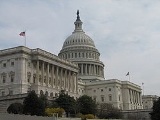
United States Senate
The United States Senate is the upper house of the bicameral legislature of the United States, and together with the United States House of Representatives comprises the United States Congress. The composition and powers of the Senate are established in Article One of the U.S. Constitution. Each U.S. state is represented by two senators, regardless of population...
Timeline of Events
|
1966
|
|
||||||
|
1968
|
|
||||||
|
1972
|
|
||||||
|
1973
|
|
||||||
|
1978
|
|
||||||
|
1986
|
|
||||||
|
1993
|
|
||||||
|
1998
|
|
||||||
|
1999
|
|
||||||
|
2000
|
|
||||||
|
2005
|
|
||||||
|
2008
|
|

